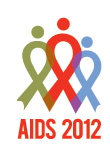 The criminalization of condoms in major cities across the U.S. is preventing sex workers from carrying them, undermining million-dollar public health efforts, endangering sex workers and contributing to the HIV epidemic. This is the conclusion of an important study presented Tuesday, July 24, at the XIX International AIDS Conference (AIDS 2012) in Washington, DC.
The criminalization of condoms in major cities across the U.S. is preventing sex workers from carrying them, undermining million-dollar public health efforts, endangering sex workers and contributing to the HIV epidemic. This is the conclusion of an important study presented Tuesday, July 24, at the XIX International AIDS Conference (AIDS 2012) in Washington, DC.
HIV continues to be a major public health risk in the United States, where more than 1 million people are living with the virus and 1 in 5 don’t know their status. According to lead study author Megan McLemore, JD, of the Health and Human Rights Division of Human Rights Watch, those numbers rise dramatically and disproportionately when looking at high-risk populations, especially sex workers and transgender persons.
Criminalization of condoms has begun to exacerbate the problem, McLemore explained.
Condoms are a proven method of preventing HIV and other sexually transmitted infections (STIs) and in many cities across the U.S., access to free condoms is a major tenet of public health efforts. However, law enforcement officials have begun using the possession of condoms as evidence in criminal proceedings against sex workers, ultimately discouraging these individuals from carrying and using protection.
“This is prompting sex workers to ask: How can you be handing us a condom on the one hand, and then putting us in jail on the other?” McLemore said.
For the study, McLemore and her Human Rights Watch colleagues interviewed more than 300 individuals in four cities that were consistently reporting the use of condoms as evidence of prostitution: New York, Los Angeles, Washington, DC and San Francisco. The group consisted of 197 current and former sex workers and more than 110 outreach workers, advocates, lawyers, public health officials and police officers.
In all four cities, the survey results showed, the suspicion of prostitution prompted law enforcement officials to stop and search individuals for condoms.
In three cities—New York, Los Angeles and Washington, DC—officials arrested sex workers, relying on condom possession as probable cause.
In three cities—New York, Los Angeles and San Francisco—officials used condom possession as evidence to prosecute.
According to the study, there are two reasons why this is both a human rights problem and a public health issue.
First, it promotes a fear of arrest—especially for transgender women—that deters them from protecting themselves against HIV.
Second, criminalizing condom use promotes misinformation. Transgender sex workers repeatedly asked the Human Research Watch researchers how many condoms were considered legal to carry. When told that it is legal to carry as many as they chose, McLemore said they were shocked, proving that even one condom-related arrest can have a devastating effect on safer sex efforts.
The study outlined key recommendations for better practices and protection of human rights. The recommendations are also highlighted in a Human Rights Watch report called "Sex Workers at Risk," which is available online.
First, police departments and district attorneys in all four cities should stop using the possession of condoms as evidence to arrest, question or detain anyone suspected of sex work or to support criminal proceedings of prostitution. These offices should also improve police training on HIV prevention and underscore the important of condoms for HIV and STI prevention as well as for sexual and reproductive health.
Next, the legislatures of New York, California and the District of Columbia should enact legislation that prohibits the use of condoms as evidence, and reform or repeal vague laws that prohibit loitering for purposes of prostitution. These laws, McLemore explained, afford a too-broad range of power to law enforcement officials and invite profiling of minorities and transgender women.
Finally, the Human Rights Watch is asking that all agencies recognize that human rights abuses—notably interfering with HIV prevention efforts—pose significant barriers to reducing HIV among high-risk groups, that agencies ensure the inclusion of sex workers and transgender women in working groups, that they call upon states to prohibit the use of condoms as evidence of prostitution and that they investigate the police abuse of sex workers and transgender persons
Advertisement
Advertisement
Advertisement






8 Comments
8 Comments